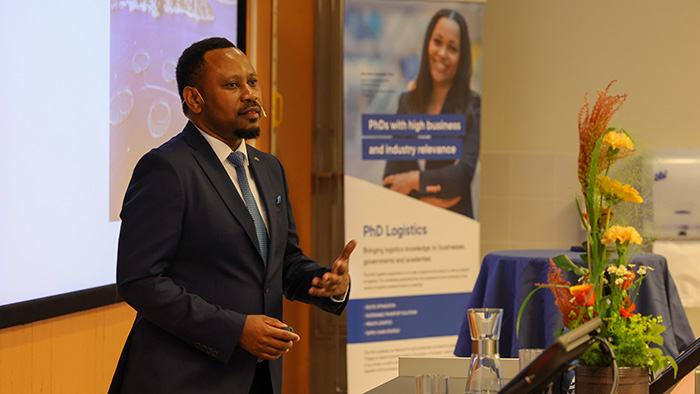Trial lecture - time and place
The trial takes place 22 August 2023 at Molde University College, room B-137.
Trial lecture title:
“How to close the gap between sustainability awareness and sustainability action in Norwegian fish farming?”
Adjudication committee
- Professor Nishikant Mishra, Hull University Business School
- Associate Professor Frithiof Svenson, Western Norway University.
- Professor Arezoo Soltani, Molde University College.
Supervisors
- Primary Supervisor Associate Professor Heidi Hogset, Molde University College
- Secondary Supervisor Professor Deodat Mwesiumo, Molde University College and Professor Amar Ramudhin, Georgia Tech’s Supply Chain & Logistics Institute.
Additional information
The sustainability practices of the food industry are being increasingly scrutinized by various stakeholders. This is due to two main factors: the current food supply chains are inadequate to meet the needs of a rapidly growing global population and the significant contribution of food production systems to global greenhouse gas emissions. For instance, the FAO's recent report indicates that the food system is responsible for 34% of the total greenhouse gas emissions worldwide. Therefore, incorporating sustainable practices into the overall business performance has been identified as a potential source of competitive advantage.
As the food industry grapples with various sustainability challenges, there is a discernible trend of individual efforts and initiatives aimed at addressing these issues. However, despite the promising efforts of individual firms, many companies encounter difficulties in organizational transformation and decision-making when it comes to optimizing sustainability goals within their overall firm performance. This stems from the fact that most sustainability challenges require changes in organizational structure that surpass the internal adaptive capabilities of individual firms and necessitate collective action at the industry level. Given this, firms are increasingly being encouraged to collaborate and partner across their supply chains, not only to address social and environmental issues, but also to enhance economic performance. However, different forms of collaboration can have varying effects on sustainability performance. Coopetition, which involves firms collaborating while also competing, has recently emerged as a potential strategy for promoting sustainability. Nevertheless, it remains unknown how coopetition can contribute to enhancing sustainability performance. This study aimed to address this gap in the literature by examining the causal mechanisms connecting coopetition and sustainability performance. To achieve this, the investigation focused on the strategic intent of coopetitors in the fishing industry, who pool their efforts to achieve Sustainable Development Goal 14 (SDG 14: Life Below Water). By investigating this cooperation, the study opened the black box of coopetition for sustainability performance by revealing the unexplored causal mechanisms.
To achieve the research objective, the study utilized a sequential mixed research method approach, starting with qualitative data collection and analysis to establish constructs for quantitative follow-up. Consequently, content analysis and Partial Least Square Structural Equation Modelling (PLS-SEM) were employed during data analysis. Moreover, Necessary Condition Analysis (NCA) was used to complement the results of PLS-SEM, offering additional insights into the crucial factors that hinder the enhancement of firms' sustainability performance.
The results show that coopetition can enhance sustainability performance in social, environmental, and economic dimensions. Nevertheless, the relationship between coopetition and firms' sustainability performance is contingent on the context. Hence, the investigation demonstrates that the dynamic capabilities and sustainability awareness significantly mediate the relationship between coopetition and firms' sustainability performance. In other words, coopetition alone is insufficient in ensuring the sustainability performance of firms unless it enables the development of pertinent dynamic capabilities and sustainability awareness. Moreover, this study employs the necessary logic approach (NCA) to provide empirical proof that economic performance is a prerequisite for social performance, but not for environmental performance. The ramifications of the COVID-19 pandemic on the economic, social, and environmental performance of firms are exemplified by the findings of this study.
Magoti Daniel Harun (37) comes from Tanzania. He earned his Bachelor of Commerce in Management Science from the University of Dar Es Salaam in 2010. Furthermore, he holds a certificate of Procurement and Supplies Professional (CPSP) from 2014, which was offered by the Procurement and Supplies Professional and Technician Board (PSPTB) in Tanzania. In 2017, he completed his MSc in Logistics, specializing in Supply Chain Management.
While pursuing his PhD, Harun has worked as a PhD Research Fellow at Molde University College. His PhD research project has been funded by the H2020 research project titled "EC-Asia Research Network on Integration of Global and Local Agri-Food Supply Chains Towards Sustainable Food Security" under Project 777742 GOLF-H2020-MSCA-RISE-2017.
